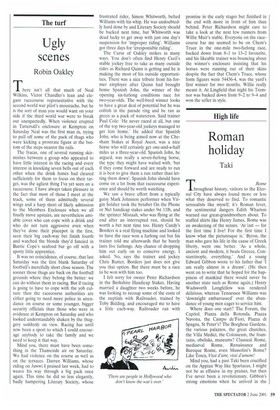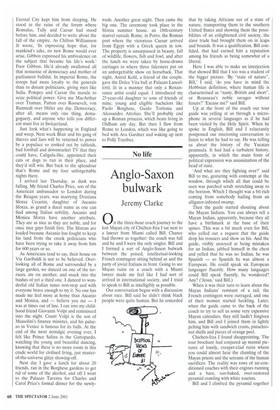High life
Roman holiday
Taki
T Rome
hroughout history, visitors to the Eter hroughout history, visitors to the Eter
nal City have always found more or less what they deserved to find. To romantic sensualists like myself, it's Roman fever, the sentimental dangers Edith Wharton warned our great-grandmothers about. To stuffed shirts like Henry James, Rome was an awakening of the senses. 'At last — for the first time I live! For the first time I know what the picturesque is.' Byron, the man who gave his life in the cause of Greek liberty, went one better. 'As a whole, ancient and modern, it beats Greece, Constantinople, everything.' And a young Edward Gibbon wrote to his father that 'I am really almost in a dream'. (He then went on to write that he hoped for the happiness of mankind there would never be another state such as Rome again.) Henry Wadsworth Longfellow was rendered delirious, whereas Tennessee Williams was 'downright embarrassedover the abundance of young men eager to service him.
Where does one start? The Forum, the Capitol, Piazza della Rotonda, Piazza Navona, the Campo de'Fiori, Piazza di Spagna, St Peter's? The Borghese Gardens, the various palazzos, the great churches, the Villa Medici, the Colosseum, the fountains, obelisks, museums? Classical Rome, mediaeval Rome, Renaissance and Baroque Rome, even Mussolini's Rome? Like Tosca, Vissi d'arte, vissi d'amore!
Mind you, had a past Taki been crucified on the Appian Way like Spartacus, I might not be as effusive in my praises, but then I've never been a revolutionary. Gibbon's strong emotions when he arrived in the Eternal City kept him from sleeping. He stood in the ruins of the forum where Romulus, Tully and Caesar had stood before him, and decided to write about the fall of the empire. As Chilton Williamson Jr wrote, 'In expressing hope that, for mankind's sake, no new Rome would ever arise, Gibbon expressed his ambivalence on the subject that became his life's work.' Poor Gibbon. He'd already swallowed all that nonsense of democracy and mother of parliament bullshit. In imperial Rome, the troops had more loyalty to the generals than to distant politicians, giving men like Sulla, Pompey and Caesar the muscle to seize political power. Give me MacArthur over Truman, Patton over Roosevelt, von Runstedt over Hitler any day. Democracy, after all, means only one thing, demagoguery, and anyone who tells you different must live in Switzerland.
Just look what's happening in England and weep. Next week Blair and his gang of thieves and liars will he returned to power by a populace so zonked out by tabloids, bad football and downmarket TV that they could have, Caligula-like, appointed their cats or dogs to run in their place, and they'd still win. But back to the splendour that's Rome and my four unforgettable nights there.
I arrived last Thursday, as dusk was falling. My friend Charles Price, son of the American ambassador to London during the Reagan years, was marrying Drusiana Sforza Cesarini, daughter of Ascanio Sforza, as grand a ducal name as one can find among Italian nobility. Ascanio and Monica Sforza have another attribute. They are as nice as they are noble, and for once nice guys finish first. The Sforzas are loaded because Ascanio has fought to keep his land from the crook politicians who have been trying to take it away from him for 600 years or so.
As Americans tend to say, their house on Via Garibaldi is not to be believed. Overlooking all of Rome and surrounded by a large garden, we danced on one of the terraces, ate on another, and snuck into the bushes of yet a third one. I danced to wonderful old Italian tunes non-stop and with everyone brave enough to try it. No one has made me feel more at home than Ascanio and Monica, and — believe you me — I was at times out of line. I ran into my childhood friend Giovanni Volpi and reminisced into the night. Count Volpi is the son of Mussolini's finance minister, and his palazzo in Venice is famous for its balls. At the end of the most nostalgic evening ever, I felt like Prince Salina in the Gattopardo, watching the young and beautiful dancing, knowing that there is no more room in this crude world for civilised living, just masterof-the-universe glitzy showing-off.
Next day I gave a lunch for about 20 friends, ran in the Borghese gardens to get rid of some of the alcohol, and off I went to the Palazzo Taverna for Charles and Carol Price's formal dinner for the newly
weds. Another great night. Then came the big one. The ceremony took place in the Sforza summer house, an 18th-century marvel outside Rome, in Porto, the Roman port where the victorious Caesar arrived from Egypt with a Greek queen in tow. The property is unsurpassed in beauty, full of wildlife, flowers, fish and fowl, and after the lunch we were taken by horse-drawn carriages to where three falconers put on an unforgettable show on horseback. That night, Astrid Kohl, a friend of the couple, gave the Dolce Vita ball at Palazzo Lancetlotti, lit in a manner that only a Renaissance artist could equal. I introduced my 25-year-old daughter to sons of friends of mine, young and eligible bachelors like Paolo Borghese, Guido TorIonia and Alessandro Attolico. Shell probably end up a Roman princess, which beats living in Oldham any day. But then I flew from Rome to London, which was like going to bed with Ava Gardner and waking up next to Polly Toynbee.











































































 Previous page
Previous page